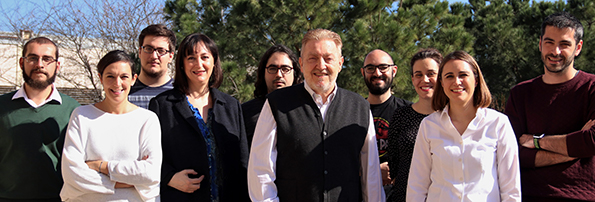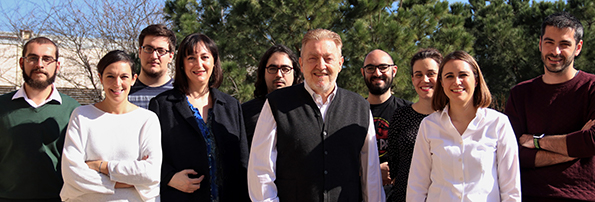
Do you want to know how to use social networks correctly while protecting your privacy? VRAIN-UPV helps you to do it.
It helps teenagers to use social networks correctly and teaches them how to protect their privacy. It is PESEDIA and it is also a social network.
Developed by research staff of the Universitat Politècnica de València (UPV), its latest advances have been published in the International Journal of Human-Computer Studies and, this Thursday, will be presented as part of the First Conference of the Valencian Institute for Research in Artificial Intelligence (VRAIN) of the UPV.
Educational games, warnings and detection of sensitive information and stress levels
PESEDIA is based on artificial intelligence (AI) techniques and includes different educational games. Among other advantages, the network developed by the Computer Technology and Artificial Intelligence Group (GTIIA) of the VRAIN-UPV Institute is able to warn the user, in a very graphic way, about the scope and risks of the information to be published.
Likewise, PESEDIA also includes a content analyzer that detects sensitive user information and is able to discern their feelings and stress level when writing their messages.
Privacy advisor not only for teenagers
“It is a network aimed primarily at teenagers, since our goal is that it serves as an educational platform in the use of social networks,” explains Estefanía Argente, a researcher at the VRAIN-UPV Institute.
“So far,” she adds, “it has been used in workshops in the last four editions of L’Escola d’estiu de la UPV, with boys and girls between 11 and 14 years old. Now, our goal is to be able to transfer the technology developed to other social networks so that it can be used not only by teenagers, but also by a more general public who want to have a personalized agent, a privacy advisor”.
How do you advise the user so that he/she is not at risk?
For the development of PESEDIA, the VRAIN-UPV Institute team classified the sensitivity of different user information: age, name, date of birth, weight… and so on up to 74 different variables. In addition, it identified those most relevant factors that make a user accept certain suggestions while browsing the social network.
“We have also developed a module that allows us to analyze the speed and typing data of users when they write messages on PESEDIA, information from which we can infer the user’s feelings and stress levels,” says Argente.
Soft paternalism
With all this in mind, the VRAIN-UPV Institute researchers proposed two “soft paternalism” mechanisms, which provide information to the user about the privacy risk of publishing a certain content.
Push by numbers and images
As Estefanía Argente explains, soft paternalism consists of showing messages to the user, such as “the privacy risk of your message is high”, “the publication may be seen by more than 1,000 users”… in order to try to influence their decision, but without limiting it.
“We have worked with what is called image push, showing, for example, the profile pictures of some of the users your message could reach, and with number push, indicating the number of users the publication will reach,” says Argente.
PESEDIA also advises through argumentation, using persuasion mechanisms to inform the user about the privacy risk of their publications. “For example, we warn the user that they could be giving information about where they are or where they are going, and we can give them more reasons to help them decide whether or not to publish the corresponding message, depending on the audience of the message, the content of the message (if it reveals medical or personal data), and the possible social problems it could cause (for example, if the message involves third parties that could be affected),” concludes the UPV researcher.
Click here for more information (spanish)


